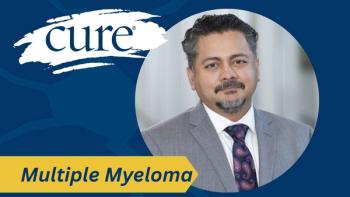
- Spring 2009
- Volume 8
- Issue 1
Lymphoma, Myeloma & Prostate Cancer
FDA approves Mozobil for non-Hodgkin lymphoma and myeloma, and Degarelix for advanced prostate cancer.
The Food and Drug Administration approved Mozobil (plerixafor) in December for patients with non-Hodgkin lymphoma and multiple myeloma who are undergoing a stem cell transplant. The injectable drug, given in combination with a growth factor called granulocyte-colony stimulating factor (G-CSF), boosts the number of stem cells in the blood, where they can be collected for transplantation.
In autologous stem cell transplantation, a patient’s stem cells are collected (called apheresis) before high-dose chemotherapy and/or radiation. The high-dose therapy kills cancer cells, but also destroys stem cells that develop into other blood cells. To counter this effect, patients are reinfused with the collected stem cells.
Typically, apheresis requires up to four hours over several days, but Mozobil appears to make the process faster and more successful. A study involving NHL patients found that in up to four apheresis attempts, 59 percent of patients taking G-CSF plus Mozobil had successful stem cell collections compared with 20 percent of patients receiving only G-CSF. Results were similar in a study with multiple myeloma patients. Adding Mozobil allowed patients to reach an adequate number of collected stem cells in a median of one day compared with four days using G-CSF alone. Side effects of Mozobil include fatigue, nausea, and diarrhea.
For more information, visit
Degarelix, a type of hormonal therapy, was approved by the Food and Drug Administration for advanced hormone-dependent prostate cancer at the end of December. At press time, possible trade names were still being reviewed by the FDA.
Degarelix, an injectable gonadotrophin-releasing hormone (GnRH) blocker, reduces levels of testosterone, a hormone produced by the testes and adrenal glands that can drive the growth of some prostate cancers. This has been shown to lower prostate-specific antigen, a measure of the amount of prostate cancer.
The FDA based its approval on phase III studies that compared degarelix with another GnRH blocker called Lupron (leuprolide), a standard treatment for advanced prostate cancer. Degarelix came out on top in the studies, primarily because of the drug’s unique mechanism of action.
Degarelix works by binding to the receptors of the brain’s pituitary cells, blocking the production of luteinizing hormone (a hormone that stimulates the testes to produce testosterone). Patients taking degarelix do not experience the initial “flare” of hormone levels (and possible cancer growth) that is seen with other GnRH blockers such as Lupron.
Phase III studies have confirmed that degarelix suppresses testosterone levels and PSA faster than Lupron without causing the initial hormone flare and cancer growth. In a phase III study published in the British Journal of Urology International, 95 percent of patients taking degarelix achieved complete testosterone suppression on the third day of treatment compared with zero percent of patients taking Lupron. After two weeks, nearly 100 percent of degarelix patients had hormone suppression, while only 18 percent of patients on Lupron reached a comparable level.
Common side effects of degarelix, such as fatigue, weight gain, and hot flashes, were comparable to Lupron, although degarelix was associated with more injection-site skin reactions. For more information, visit
Articles in this issue
over 16 years ago
The Final Journey: The Life and Death of Judy Abernathyalmost 17 years ago
Web Exclusive: What Is a "Good Death?"almost 17 years ago
Web Exclusive: Resolving Your Own Deathalmost 17 years ago
Web Exclusive: Understanding Hospicealmost 17 years ago
Web Exclusive: Find a Clinical Trial That's Right for Youalmost 17 years ago
Web Exclusive: Find a Clinical Trial That's Right for Youalmost 17 years ago
Web Exclusive: Eulogy for Dr. Phillip Bermanalmost 17 years ago
Web Exclusive: A Granddaughter's Eulogyalmost 17 years ago
Calming Cancer Painalmost 17 years ago
Excerpt: When Hormone Therapy Can Stress You Out



